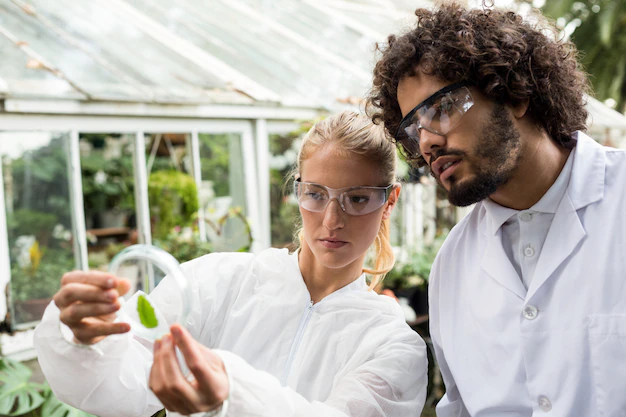- Agricultural biotechnologists apply biotechnology techniques and principles to improve agricultural practices and enhance crop production. They use genetic engineering, molecular biology, and other advanced technologies to develop and modify plants and animals for desirable traits.
- These professionals work on a wide range of projects, including developing genetically modified crops with improved pest resistance, drought tolerance, or nutritional content. They may also work on developing vaccines for livestock or improving breeding techniques.
- Agricultural biotechnologists often collaborate with plant breeders, geneticists, and other scientists to design and conduct experiments. They may work in research institutions, agricultural companies, government agencies, or academic settings.
- A strong background in biological sciences is essential for a career in agricultural biotechnology. Biotechnologists typically hold a bachelor’s or master’s degree in fields such as biotechnology, genetics, molecular biology, or agriculture.
- Skills in genetic engineering techniques, such as DNA sequencing, gene editing (e.g., CRISPR-Cas9), and genetic transformation, are crucial for agricultural biotechnologists. They must have a solid understanding of genetic principles and be able to apply them effectively.
- Agricultural biotechnologists need to stay up to date with the latest developments in biotechnology and agricultural research. They must be familiar with emerging technologies and trends to design innovative solutions for agricultural challenges.
- Research and laboratory skills are fundamental in this role. Biotechnologists must be proficient in designing experiments, collecting and analyzing data, and interpreting results. They often use specialized equipment and software to carry out their work.
- Effective communication skills are important for agricultural biotechnologists, as they need to present their findings and research proposals to colleagues, stakeholders, and sometimes the general public. They should be able to convey complex scientific concepts in a clear and understandable manner.
- Ethical considerations play a significant role in agricultural biotechnology. Biotechnologists must be aware of the potential risks and benefits associated with genetically modified organisms (GMOs) and follow strict safety guidelines and regulations.
- Agricultural biotechnologists contribute to addressing global food security challenges and promoting sustainable agriculture. Their work has the potential to improve crop yields, reduce pesticide use, enhance nutrition, and contribute to the development of resilient and climate-smart agricultural systems.
Join 'Farmers Mag' WhatsApp Channel
Get the latest Farming news and tips delivered straight to your WhatsApp
CLICK HERE TO JOIN






